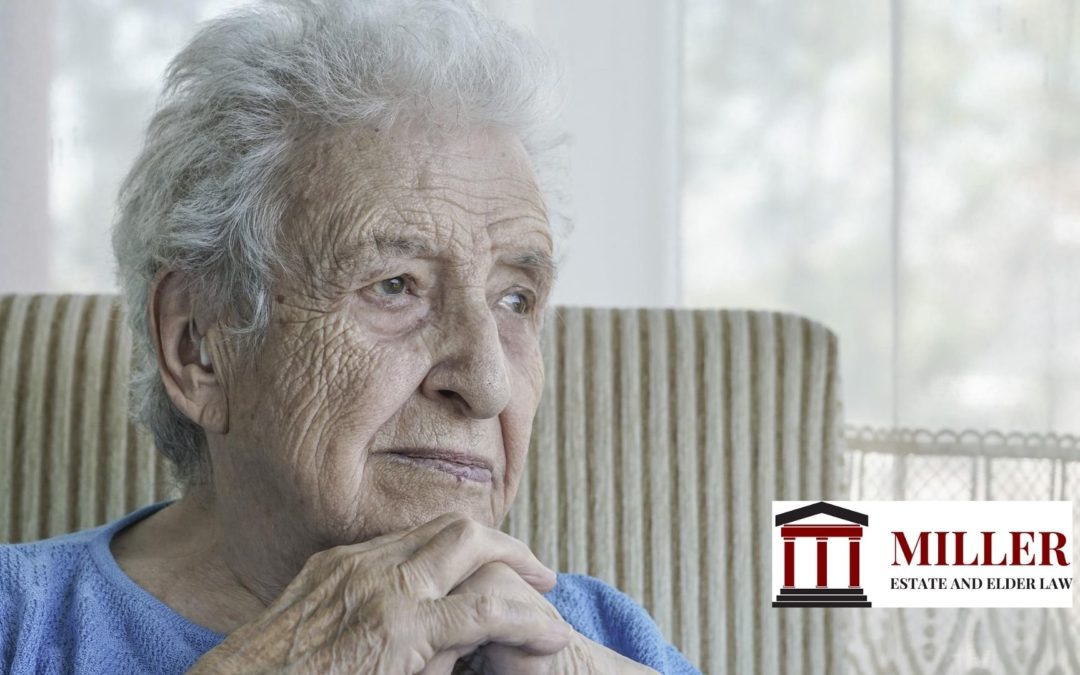
by Bill Miller | Sep 7, 2021 | Elder Law, Estate Planning, Uncategorized
A power of attorney is one of the most critical documents you can have. A recent study showed that only 33% of Americans over the age of 55 have a durable power of attorney in place. Tragedy or illness can strike at any moment. Obtaining a power of attorney—or POA as it is often called—is a proactive way to save you and your family a lot of stress and heartache in the event that you become incapacitated, or otherwise unable to make decisions for yourself.
A POA allows you to designate an individual—or several individuals—who could take control of your assets, conduct legal transactions, and make decisions on your behalf if you were unable to do so. However, without this document in place, things can quickly become complicated in the event that you become incapacitated.
Your Family May Have To Apply for Guardianship of Your Children
Without a proper POA in place, your family (yes, even your spouse) may have to apply for guardianship with the courts in order to make decisions on your behalf. This can be a costly process, and could take several months to complete. However, time is often of the essence in situations where a parent becomes incapacitated. You can avoid a problematic situation by having the proper documents in place.
You Could End Up With Major Financial Problems
Having the proper POA in place would allow you to designate an individual to step in and handle your bills—such as your mortgage, insurance, etc.—on your behalf. Without a POA in place, bills could potentially go unpaid, which could result in bad credit, lapse of insurance coverage (which is needed more than ever during these times), foreclosure, and even being forced into bankruptcy.
You Could Be Denied Medicaid
If you are being sent to a nursing home in need of long-term care, it is imperative that you have Medicaid in place to help pay for care. Nursing home care in Alabama costs, on average, $266/day. If you are incapacitated and unable to make medical decisions for yourself—and have not already applied and been accepted to receive Medicaid—it is vital that you have a POA in place. The Medicaid application requires copious amounts of documentation and records. A POA will grant a trusted individual with the permission they need to access these documents and records. If no one is able to access these important documents and records, your application to Medicaid may be denied..
Your Loved Ones Could Be Unable to Access Your Medical Records
In order for your designated POA to gain access to your medical records, you will need the POA to include an authorized Health Insurance Portability and Accountability Act (HIPAA) form. With a HIPAA authorization on file, your named POA will be able to obtain all of your medical records, as well as oversee your treatment and care. This can be critical when needing to transfer medical records to new providers or specialists. However, without this form, not only would the designated POA be unable to receive your medical records, but some doctors will refuse to release sensitive medical information, even with a POA in place!
You May Not Be Able to Transfer Assets
There are several circumstances where an estate planning attorney may recommend transferring assets out of an incapacitated person’s name. For example, if you are incapacitated and in the nursing home for an extended period of time, and your designated POA is applying for Medicaid on your behalf. If you have a POA in place, he or she can transfer assets as recommended by your estate planning attorney in order to prepare your estate for the Medicaid application. However, without this POA in place, no one would be able to transfer assets, and—therefore—your Medicaid application could be denied.
While many of the situations that require a power of attorney are less than ideal and can be stressful in and of themselves, having a plan in place before it’s needed can make the process much easier on your family and friends.
If you have questions about a Power of Attorney or want to include one in your estate plan, then contact Miller Estate & Elder Law at (256) 251-2137 or register for one of our free estate planning workshops.

by Bill Miller | Aug 24, 2020 | Blog, Medicaid, Medicaid Qualification, Uncategorized
Almost 90 million American rely on Medicaid for health care benefits. In fact, Medicaid pays for more health care than any company in the United States. So, you may immediately think of Medicaid when you can’t pay for your medical care. You may be wondering, “How do I apply for Medicaid?” This article may provide an answer to this important question.
Choosing the Right Program
Medicaid does not just offer one benefit or one program. Alabama Medicaid offers several benefits, including:
- Medicaid for Children
- Medicaid for Parents and Caretaker Relatives
- Medicaid for Pregnant Women
- Medicaid for the Elderly and Disabled
- Medicaid in the Nursing Home
As you can see, Medicaid has programs to cover Americans from the cradle to the grave. Also, many individual programs consist of more than one element. For example, Medicaid for the Elderly and Disabled (E&D) also offers Home and Community-Based Waivers and SSI-Related Programs.
Once you choose the programs you need, it’s time to apply.
Completing the Paperwork
The Alabama Medicaid website contains several applications and additional forms. Certain programs require or allow online applications. Choose the forms that you need for the program you want.
Another form – Tips for Applying for Institutional (Nursing Home) Medicaid – offers a list of documents needed. The form also offers tips for making the process a little easier.
The most important thing to remember is that your application must be complete, with all supporting documents.
Submitting the Application
The final step is getting your application to the right place:
- Apply online if you are pregnant, applying for a child, or applying for Plan First Family Planning. You may also mail an application to P. O. Box 5624, Montgomery, AL 36103-5624.
- Use a paper application to apply for nursing home care, home and community-based waiver program, or help paying for Medicare. You may also contact the district office or Customer Service Center for your county.
“How Do I Apply for Medicaid?” With Help from Someone Who Understands
Applying for Medicaid is time consuming, frustrating, and difficult. You can ease the process a little by finding an experienced Alabama Medicaid attorney.
The attorneys at Miller Estate and Elder Law have years of experience working within the Medicaid system. They help clients like you with Medicaid applications as well as advanced Medicaid planning.
Schedule a consultation with one of the attorneys at Miller Estate and Elder Law. Our phone number is 256-472-1900. We are located at 818 Leighton Avenue in Anniston, but we serve clients in communities like Hoover, Vestavia Hills, Irondale, and Calera.
Also, take a look at some of the free guides offered on our website.

by Bill Miller | Aug 17, 2020 | Blog, Medicaid, Medicaid Planning, Medicaid Qualification, Uncategorized
Sometimes the more answers we get, the more questions we have. The same may be true when it comes to Medicaid. Someone who needs help paying for medical care or a nursing home may be relieved to learn that Medicaid offers this type of benefits. Then they learn that the application process is difficult. You have to qualify for Medicaid benefits, and some of the requirements are hard to understand. For example, you may want to learn more about the Medicaid income limit. That’s what we will explore in this blog.
First, what are the basic Medicaid qualifications?
Medicaid offers several programs, each with its own qualifications. For example, Medicaid for Pregnant Women and Medicaid in the Nursing Home target very different groups. That said, Medicaid generally is intended for people with low incomes. Applicants who exceed the Medicaid income limit usually will not qualify for benefits.
What is the current Medicaid income limit?
It varies. The income limit for people who qualify through Supplemental Security Income (SSI) is $791 per month / $1,177 for couples.
However, the Medicaid in the Nursing Home program income limit is $2,313 per month for one person. This limit also applies to:
- Elderly and Disabled Waiver,
- Independent Living Waiver,
- Persons with Intellectual Disabilities Waiver, and
- Technology-Assisted Waiver for Adults.
Effective February 2019, Medicaid uses the Modified Adjusted Gross Income (MAGI) method of determining income for some programs. For example, the Plan First and Pregnant Women & Children programs calculate income after deductions based on family size:
Family of 1 = $1,520
Family of 2 = $2,058
Family of 3 = $2,596
Family of 4 = $3,133
You may be wondering if Medicaid counts all your income when determining if you are qualified for benefits.
What does Medicaid consider to be income?
Generally, Medicaid counts all the following income toward your Medicaid income limit:
- Federal taxable wages;
- Self-employment income;
- Unemployment compensation;
- Social Security benefits, including Social Security Disability Income (SSDI);
- Retirement or pension income;
- Alimony or spousal support for divorces finalized before January 1, 2019;
- Capital gains;
- Investment income;
- Rental and royalty income; and
- Untaxed foreign income.
Income that is not counted toward the limit includes:
- Supplemental Security Income (SSI);
- Veterans’ disability payments,
- Workers’ Compensation,
- Proceeds from loans, including student loans; and
- Child support.
I’m just over Medicaid income limit. Is there anything I can do?
Possibly. Just talk to an experienced Alabama Medicaid lawyer about Medicaid planning and spend-down strategies.
The attorneys at Miller Estate and Elder Law assist their clients with Medicaid and incapacity planning, as well as general estate planning. Contact Bill Miller at 256-251-2137 to schedule an appointment. Though our office is now located at 818 Leighton Avenue in Anniston, we serve clients in Gadsden, Hoover, Talladega, Vestavia Hills, and surrounding areas.
Also, download a copy of our free e-book, Medicaid Planning in Alabama: What You Need to Know, by clicking here.

by Bill Miller | Jul 29, 2020 | Blog, Medicaid, Uncategorized
Martha W.’s family knew she needed help, and she needed it now. She suffered from several serious medical conditions. As a result, she found it increasingly difficult to carry on with her activities of daily living, like cooking or getting dressed. Martha’s family had never looked into government assistance programs and became confused when they finally did. For example, what’s the difference between Medicare and Medicaid? Let’s look at some of the important benefits offered by each program.
First, the Basics
Both are programs offered and managed by the federal government. Also, both help with medical care.
Medicare is essentially a government health insurance policy that is available to a certain group of qualifying individuals. Workers pay taxes to cover future Medicare costs for themselves and their family members.
Medicaid is more of a public assistance program funded by public tax funds that cover healthcare expenses.
Qualifying for Medicare and Medicaid
The eligibility requirements for these programs are very different. For example, Medicare is generally available for people:
- Age 65 or older;
- Under age 65, but with disabilities; and
- Who suffer from End Stage Renal Disease.
People may qualify for Medicaid if they meet:
- Income limits;
- Age requirements; or
- Requirements specific to a certain program.
One important difference between the programs is that Medicare eligibility is not income-based, while Medicaid is. Additionally, both Medicare and Medicaid offer benefits with different requirements.
Benefits Provided by Medicare and Medicaid
Both offer more than one program. In fact, Medicaid programs can vary from state to state. We’ll just look at the programs offered by Alabama Medicaid.
Medicare:
- Part A (hospital insurance) is premium-free for most people who paid Medicare taxes.
- Part B (medical insurance) covers some doctors’ services, outpatient care, medical supplies, and preventive services.
- Part D (prescription drug coverage) pays for some prescription drugs.
Medicaid:
- Medicaid for Children
- Medicaid for Parents and Caretaker Relatives
- Medicaid for Pregnant Women
- Medicaid for the Elderly and Disabled
- Medicaid in the Nursing Home
- Breast and Cervical Cancer Program
- Plan First Family Planning Program
- Help Paying for Medicare Costs
People can apply for either program, depending on their needs.
The Application Process
Applying for Medicare is fairly easy. Just complete an online application. There’s no need to submit documentation.
On the other hand, Medicaid generally requires an application and many supporting documents.
Learn More About Medicare and Medicaid
Contact Bill Miller at 256-251-2137 to schedule an appointment. The attorneys at Miller Estate and Elder Law can explain the difference between Medicare and Medicaid and help your Medicaid application. Even better, we can help you with Medicaid planning to increase your chance of getting Medicaid and keeping as much property as possible. Though our office is located at 818 Leighton Avenue in Anniston, we serve clients in Gadsden, Hoover, Talladega, Vestavia Hills, and surrounding areas.

by Bill Miller | May 4, 2020 | Blog, Elder Law, Uncategorized
Did you know May is National Elder Law Month? This month holds special importance to us as we support all Alabama seniors, their loved ones, and their caregivers. We know that you and your family may need extra help not only this month, but throughout the year. One of our goals as a firm is to ensure that you are protected in all circumstances. We want to ensure that you have the help, guidance, and resources you need now, and throughout the year.
Unfortunately, many Alabama seniors and their loved ones have only taken the step to complete their estate planning. While estate planning is essential, it is not elder law planning. Estate planning contemplates both lifetime and end-of-life decisions. For example, you can make a document such as a durable power of attorney that can ensure that you have a decision maker with legal authority in place in the event you cannot make decisions for yourself. Or, by contrast, you could make a last will and testament that directs who should inherit from you at the time of your passing.
The same tools, however, do not necessarily protect you by addressing elder law concerns. Elder law, sometimes referred to as elder care law, is a relatively new area of law. It primarily addresses the issues that can arise as a result of the aging process. For example, should you need long-term care:
- How will you find the right care for you?
- How do you know what to look for?
- Can the services you need be provided in your home?
- Further, if you were to need to move to a long-term care facility, would you be able to pay for it?
Many of us do not have unlimited resources. This means, without elder law planning, we would be at risk of losing all of our assets and impoverishing our loved ones if we had to pay for the high cost of nursing home care without assistance.
We know these may be considerations that you have never thought of before. This National Elder Law Month, let us take a moment and share information on three critical areas addressed through elder law planning that you need to know for yourself and your family.
1. Alabama Medicaid. Medicaid is a combination of state and federal dollars that you may be able to access to help you pay for the cost of long-term care. Know that Medicaid is not Medicare. While all seniors are eligible for Medicare this is not the same thing for Medicaid. Medicare is a health care program that can help most seniors defray the cost of acute medical care. Medicaid, by contrast, is an eligibility program that can help pay for custodial care in a nursing home. You must qualify through a health, income, and asset test to be able to access these valuable resources, which we can discuss with you in a consultation at our firm.
2. Family Caregivers. Family caregivers are the unsung heroes in America. Family caregivers are often under-appreciated and unpaid for the services that they provide. Further, without the guidance of an elder law attorney, you may be paying your family caregiver for his or her much-needed help, but jeopardizing your ability to access the benefits of the Medicaid program. This is one of the things that we can discuss in a meeting at our office. The most important thing is for you to know that you are not alone. You can click this link to learn more about how to best manage this new responsibility in your life and how to help yourself and the aging senior you are caring for.
3. Veterans Affairs Pension Benefits. For wartime veterans and their dependents, there are additional benefits available through the department of Veterans Affairs. One such benefit is the pension program. This is a monthly, tax-free benefit that is available to qualifying Alabama seniors. Similar to Medicaid, there is a health, income, and asset test as well.
We know this article may raise more questions than it answers. We encourage you not to wait to learn more about the benefits and resources available to Alabama seniors now, or at any point in the future. Do not wait to schedule a meeting with attorney Bill Miller to discuss your questions and learn how to protect yourself and your family.

by Bill Miller | Oct 4, 2019 | Uncategorized
When Grandpa Joe died last year, his children assumed they could immediately take possession of his property – the family home and the fishing cabin down by the lake. They were dismayed to learn they had to wait until Grandpa Joe’s estate went through probate. Without some advance planning, there was no way to go about transferring property without probate.
Transferring property after the owner’s death often happens through probate.
When someone dies, their property passes to their heirs. If the deceased person left an estate plan, the whole process is typically easier than when there’s no Will. However, the personal representative of the estate cannot pass ownership of the property to the heirs until probate is completed. This can take months and, occasionally, years. It is simply not the best way to transfer property to your heirs. Fortunately, you have options that help you avoid or minimize your heirs’ probate nightmare.
There are ways to pass property without probate.
Estate planning is where you can make this happen, especially when your estate plans are coordinated with your financial plans. Some of the ways you can transfer your property more easily and quickly than probate include:
Property Titles. You can own property, particularly real estate, in several ways. For example, a married couple might choose to own their home through joint tenancy with right of survivorship. When one spouse dies, the other spouse takes full ownership of the home. Joint ownership can be tricky, so talk to your attorney before titling your property.
Beneficiary Designations. Financial institutions and insurers allow account holders to name beneficiaries. By completing a few forms, usually online now, you can make sure that funds remaining in your account and insurance payouts go directly to your heirs without becoming probate assets. Make sure you coordinate your beneficiary designations with your estate plan because beneficiary designations trump your Will.
Revocable Living Trust. This common trust is fairly easy to form and fund. The grantor signs a trust document prepared by an attorney, then transfers ownership of his or her property to the trust. When the grantor passes away, the assets transfer to beneficiaries based on the terms of the trust without going through probate.
Curious about estate planning and probate?
It helps to have an experienced, knowledgeable attorney at your side. For a free consultation with Attorney Bill Miller, contact us at 256-472-1900. Miller Estate and Elder Law is now located at 818 Leighton Avenue in Anniston, but we serve clients in Gadsden, Hoover, Talladega, Vestavia Hills, and surrounding areas. Also check our website for free resources like Seven Steps to Handling Your Loved One’s Estate.





